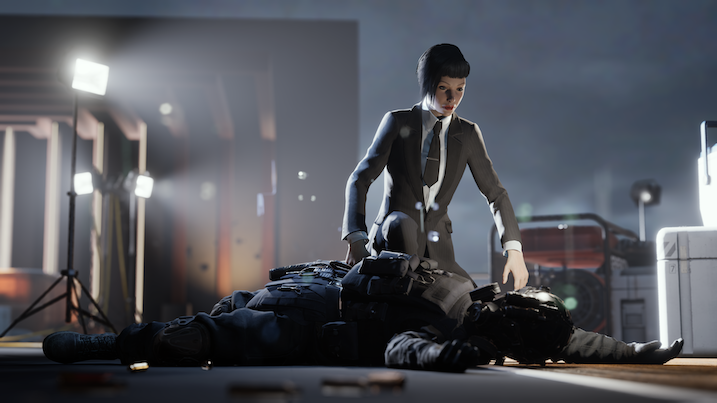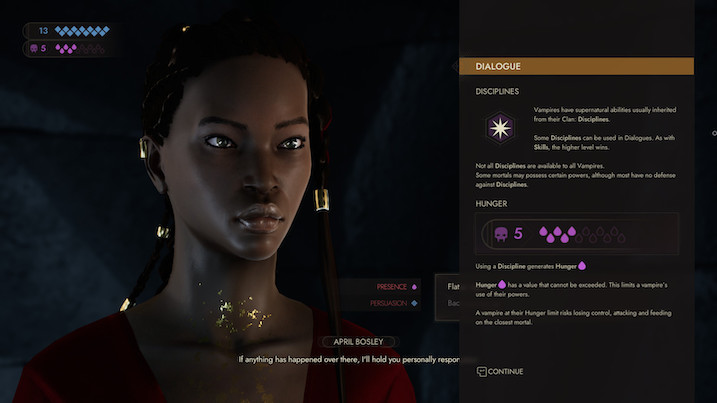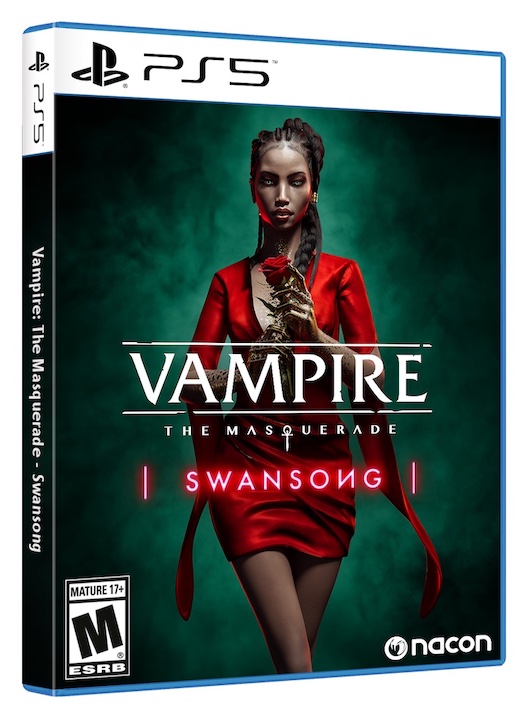‘Vampire: The Masquerade – Swansong’ Has Bite (Video Game Review)
 The first big interactive narrative adventure of 2022 has arrived, and the title: Vampire: The Masquerade – Swansong, is indeed a mouthful. The height of choice-driven video games is, arguably, Quantic Dream’s 2018 masterwork Detroit: Become Human, which is also an ungainly thing to say aloud. Regardless, that was four long years ago. We’re waiting for the latest from that developer, which will be set in a galaxy far, far away, Star Wars: Eclipse. I look forward to receiving a trophy for cleaning my lightsaber via a sequence of triangles, squares, and circles. Until then, we have french developer Big Bad Wolf’s resurrection of a vampire series based on a ’90s tabletop game (No, I hadn’t heard of it, either). I took a chance on this tale of rival vampire sects set in modern-day Boston. Filled with deadly serious, seriously silly writing where the undead use words like Embrace (turn a human into a vamp), Vessels (humans used for blood) and Final Death. Terms that take on bigger meaning in genre fiction. Does this narrative adventure have bite, or does it suck?
The first big interactive narrative adventure of 2022 has arrived, and the title: Vampire: The Masquerade – Swansong, is indeed a mouthful. The height of choice-driven video games is, arguably, Quantic Dream’s 2018 masterwork Detroit: Become Human, which is also an ungainly thing to say aloud. Regardless, that was four long years ago. We’re waiting for the latest from that developer, which will be set in a galaxy far, far away, Star Wars: Eclipse. I look forward to receiving a trophy for cleaning my lightsaber via a sequence of triangles, squares, and circles. Until then, we have french developer Big Bad Wolf’s resurrection of a vampire series based on a ’90s tabletop game (No, I hadn’t heard of it, either). I took a chance on this tale of rival vampire sects set in modern-day Boston. Filled with deadly serious, seriously silly writing where the undead use words like Embrace (turn a human into a vamp), Vessels (humans used for blood) and Final Death. Terms that take on bigger meaning in genre fiction. Does this narrative adventure have bite, or does it suck?

Back in 1991, a new kind of tabletop role-playing game debuted. Unlike TSR’s Advanced Dungeons & Dragons, White Wolf’s Vampire: The Masquerade was not set in a fantastical or even a sci-fi (Cyberpunk 2020) realm but a modern day gothic one. You played as a vampire (called kindreds), part of a secret society that lived among mere mortals. Keeping up the “masquerade” is vital to the sun-impaired’s survival. Final Death awaits any member that breaks the biggest no-no: making their presence known to humankind. Sucking the life out of a vessel in front of the living is not allowed.
Although Anne Rice’s Interview with the Vampire debuted in 1976, most tales of bloodsuckers were still mostly loners like Dracula or straight-up monsters in late 20th-century fiction. Rice’s work and Masquerade paved the way for Twilight, CW’s The Vampire Diaries, and countless other stories about relatable creatures of the night with particular juice diets.
In 2004, Troika Games released Vampire: The Masquerade – Bloodlines on PC. I had never heard of it but a quick look on Twitch revealed many streamers relishing the early action RPG. Essentially, it’s a less polished kind of campaign BioWare would perfect with Star Wars: Knights of the Old Republic, Dragon Age, and Mass Effect. Games I adore.
Just last month, before the release of Swansong, another developer, Sharkmob AB, released Vampire: Masquerade: Blood Hunt on consoles (the PC version came out in 2021). It’s a free-to-play battle royale set in Prague. I had zero interest, but my time with Swansong has already left me craving more of the under-the-radar series. I even wish Bloodlines was on consoles, as I would surely give it a go. Nearly two decades later it’s still only available on PC.

For those unfamiliar with less action-oriented games, Swansong is a narrative RPG. There are no traditional “gamey” scenarios like shooting or (mostly) fighting of any kind. You’ll play as three characters: Emem, Galeb and Leysha. Each one has particular skill sets that can be tailored to the player’s liking… to a point. The main gameplay consists of conversations with NPCs and traditional sleuthing. Hitting L1 (on PlayStation) activates the de facto “Arkham detective mode” most titles feature nowadays. It makes sense, as, at its heart, this is a detective story.
Mild spoilers: the Prince of Camarilla, the reigning vampire sect of Boston, is alerted to a Code Red: an emergency lockdown procedure. Fellow kindreds are dead, some missing from a party the evening the story starts. A massacre has occurred, so it’s up to Prince Hazel’s three most trusted immortals to assess the damage and plan for an upcoming war against the Second Inquisition, high-level priests with no sense of humor. The narrative structure features the three leads checking in with Hazel for further orders. Each mission is about twenty minutes give or take getting stuck.
The player completes missions by investigating areas: secret offices, underground lairs, and even a rogue biker band of vampire kindred misfits known as the Anarchs. Computers must be hacked, and special abilities, like spells that reveal invisible items, will be vital. Of note: all smartphones are banned in the world of Camarilla to cut down on being tracked by humans.

Emem, a cool, snarky vampire, can slingshot herself across long distances. Leysha can not only turn invisible but can mimic the appearance of others. Meanwhile, Galen mostly just looks dope in his suits, using his deep voice to compel mortals to his will. Occasionally, you’ll need to feed on vessels, but this means finding a safe room first and, hopefully, not holding R2 too long, as that will kill them dead.
When you’re not doing these amusing but often underused abilities, you’ll be talking to everyone. Unlike most games that offer dialogue trees, Swansong’s are fairly complicated. I’ve played through the whole story once, and I’m still baffled at how the system works.
The main idea is to use RPG mechanics like dice-rolling between encounters. One’s persuasion, intimidation, and focus are linked to other traditional RPG gameplay, like skill trees. Simple exchanges like “when was the last time you saw them?” queries are often front loaded with the player gambling with a limited amount of persuasion points. This is can be tricky when an encounter becomes a confrontation. Confrontations limit the number of answers you can get wrong. So, if I have thirteen points and it costs me five to win a confrontation, I need to consider if the information gleaned is worth it. Will I need those points later? Thankfully, points reset after each story act.

The game is broken up into 21 scenes. Each with a high level of risk versus reward. I try to play narrative adventures straight through without restarting from a previous auto-save (You can’t manually save, although there are three save slots). If a character experiences final death (it can happen), that’s it for that particular character. The upside are numerous endings to be unlocked and other story beats which can only be experienced upon multiple play-throughs. Good luck getting that platinum, trophy hunters.
These types of games aren’t super fun in the traditional sense. You can’t just turn your brain off to mindlessly shoot baddies in between vital moments. Detroit or Supermassive’s Until Dawn featured finely crafted stories, engaging characters, and high production values. The technical issues were (mostly) non-existent. Those titles were Sony exclusives. Detroit: Become Human had a AAA budget. Swansong didn’t have those deep pockets so some glitches and other minor annoyances were expected.
Having said that, there’s a lot that’s left to be desired. Cutscenes/dialogue can’t be skipped the first time you play. Often that can feel confining, restrictive. I went through the first twenty minutes only to have it crash my PS5. A few times, items I should be able to pick up didn’t highlight, so I had to restart from the auto-save. This can be a pain.

The voice acting is more than often merely serviceable. Of the trio, I liked Emem as performed by Blessed Niayemi best. The less said about Leysha’s child/vampire, Halsey, the better. A strength of Swansong is how it leans into camp but flat line deliveries can be a distraction.
Then there are other “by design” issues that, in 2022, have the game come up short. Case in point: the world-building of The Masquerade is quite compelling. Every character you meet, every location, and all of the vampire lore is accessible to read in a codex. There are pages of information on each character. And I wanted to read them! To my dismay, the font was super tiny with no option to make it larger — Come on, Big Bad Wolf!
The points to sink into skills that make dialogue options easier don’t reward the game’s completion. There is no new game plus mode. Do I want to witness the other endings and branching paths? Absolutely but starting from scratch with characters I’ve crafted over twenty hours reset back to level 1 is a missed opportunity.
Priced at $50 for the PS5 version instead of $60, makes Vampire: The Masquerade – Swansong easier to recommend, although I hope future updates address the issues I experienced. If you’re looking for an engaging vampire tale that’s one part telenovela and another part mid-2000s C.S.I.: Boston (with the undead), this game may be worth sinking your teeth into.
![]()
![]()
![]()


Vampire: The Masquerade – Swansong is available for PS4, PS5, Xbox One, Xbox Series X|S, and Microsoft Windows.


















